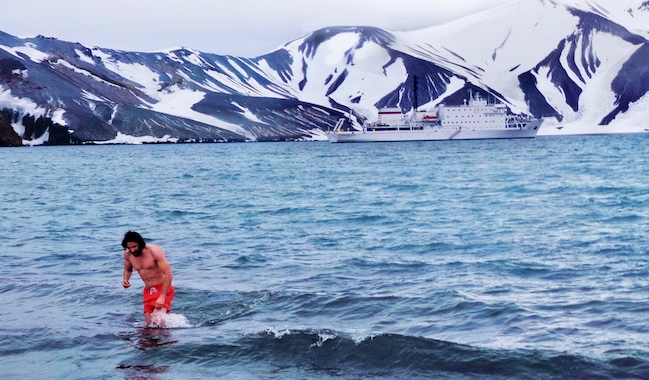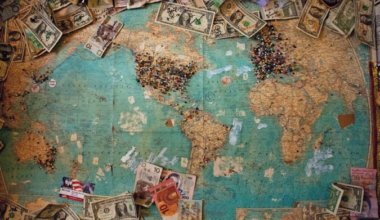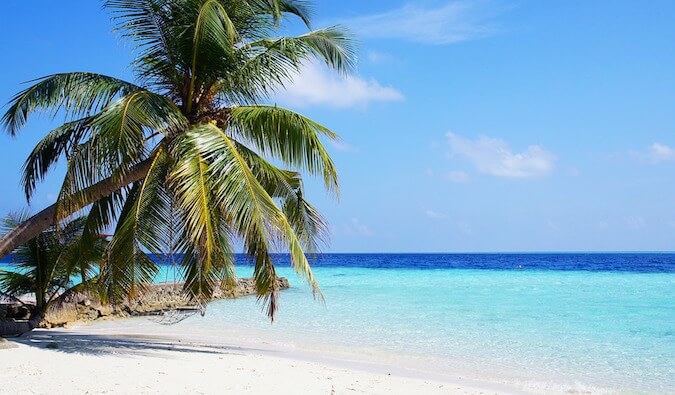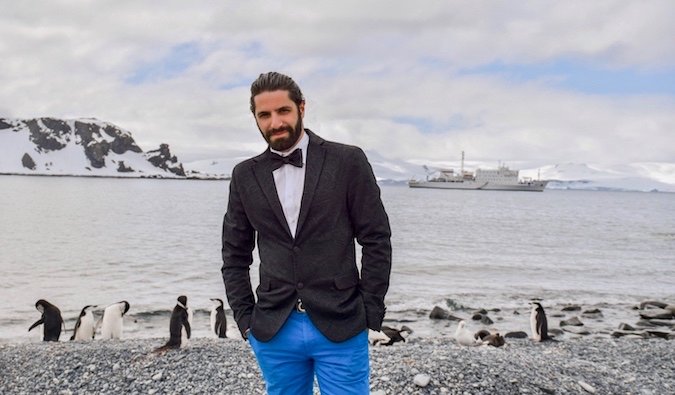
Posted: 07/06/17 | July 6th, 2017
Everybody wants to have more exciting, interesting, and adventurous travels. It’s those epic trips that make for the best stories, the best photos, and the best memories.
Wanting to find out how we can have more adventurous travels (and lives!) I sat down with scientist, influencer, adventurer, and author Jon Levy to discuss the possibility of creating more consistent adventures.
Tell everyone about yourself!
My name is Jon Levy. I am a behavioral scientist, and I specialize in understanding influence and the science of adventure. I’ve spent the last decade traveling around the world trying to understand what causes people to live fun, exciting, and fulfilling lives. What I discovered was that every adventure follows a four-stage process that can make any person’s life more adventurous. I chronicled these discoveries in a book called The 2 AM Principle: Discover the Science of Adventure.
What is “the 2 AM principle?” I hear nothing good happens after that time!
Nothing good happens after 2am — except the most epic experiences of your life!
The book is about my research and discoveries in the science of adventure. It includes some outrageous stories of my life: I get crushed by a bull in Pamplona. I beat Kiefer Sutherland in drunken Jenga, then he forgets that he invited me to his family Thanksgiving, which we both realize when I show up. Within 10 seconds of meeting, I convince the woman at the duty-free checkout counter in Stockholm airport to quit her job and travel with me.
When people go on adventures, they will often try to push the experience long past the point of enjoyment. As a result, they remember the experience less fondly and are less likely to participate in the future. The 2am principle is the idea that there is a clear time when you should call it a night and go to bed — or you should push onward and make the experience more “EPIC.” What do I mean by EPIC?
I discovered that every adventure follows a four-stage process: Establish, Push Boundaries, Increase, and Continue (EPIC). These stages have specific characteristics that when applied make life exciting. The best part is: anyone can use the process.
In the book, I explore the science that makes this possible, so that any person can lead a more adventurous life. All they have to do is follow the process.
For example, there’s a simple idea called the peak-end rule. Psychologists Daniel Kahneman and Barbara Fredrickson found that human beings judge an experience based on the peaks and the end, not its entirety.
Imagine that you are having one of the best dates of your life. However, at the end, your date turns to you and says the most awful thing that you ever heard. It might be something that completely contradicts your values or that you find offensive. If someone were to ask you later how your date went, you would say it was terrible. In reality, it was three hours of good and three seconds of terrible.
This means that we need to understand when to end an adventure, and when to keep going. Often you are better off ending early and on a good note. Otherwise you could end up at a pizza place at 4 in the morning trying to convince your friends to keep going. The fact is if you don’t end positively, you will remember the experience less fondly, and be less likely to participate in opportunities in the future.
What made you decide to write this book?
I think what inspired me most were movies like Ferris Bueller’s Day Off; I wanted to understand how those characters did what they did. I wanted to understand what it would take for me to live a life that is worthy of Hollywood.
I was a geek growing up — and back then, there was no such thing as a cool geek. I thought that my love of science could help me figure out how to fit in. This book is really for the ones that didn’t quite fit in, who didn’t know how to act at a party or maybe never even got invited.
Is there really a science to adventure?
Undoubtedly, yes, there’s a science to just about anything that you want to do. As a species, humans have certain universal characteristics. What excites me might be different from what excites you, but we both experience excitement. That means that we are both capable of having adventurous lives. As I define it, an adventure has these characteristics:
- It’s exciting and remarkable – The experience is worth talking about. As a species, we’ve spent millennia passing on our knowledge orally. If it’s not worth talking about, it’s not culturally relevant.
- It possesses adversity and/or risk (preferably perceived risk) – You have to overcome something. Although our brains process imminent peril (a snake biting you) differently than a perceived risk (looking over the edge of a mountain), the physical response is incredibly similar. You can participate in activities that are frightening but incredibly safe. It is the difference between climbing Everest and skydiving. Almost no one ever gets hurt skydiving.
- It brings about growth – You are changed by the experience. You will notice that in every great hero or heroine’s journey, the participant is changed from the experience. They have a greater capacity and skill set in the end compared to when they started. The true gift of an adventure is not just the stories you will tell, but the person you become in the process.
If you can do something that fulfills these characteristics, then you’ve had an adventure. For some people that might be visiting a new city; for others, it might be talking to strangers.
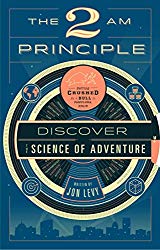
I think the difference is our desire for novelty and our willingness to be uncomfortable. Our brains have a novelty center called the substantia nigra/ventral tegmental area (SN/VTA). Researchers Nico Bunzeck and Emrah Düzel examined this part of the brain with an MRI and found that it reacts differently when exposed to new stimuli. For instance, novelty motivates the brain to explore.
Ultimately, the size of your life is proportional to how uncomfortable you are willing to be. It is uncomfortable to leave home and our friends, to be in a new culture where you don’t know the customs, but it is exciting. Some of us have that desire for novelty and others don’t. That’s fine — we don’t all need to be the same. But if you are willing to be daring, push your comfort zone, and put yourself out there, life is a grand adventure.
How did you get into travel?
The reason I started creating an ambitious travel project is about as clichéd as one can imagine. It was because of a girl. I don’t know if you have ever gone through a really bad breakup, but I did. To reward myself for getting through it in a healthy way, I decided that every month for a year, I would travel to the biggest events, no matter where they were held.
I didn’t know how I was going to pay for it. I was working a full-time job, and I didn’t even know what some of these events were until right before. After telling all of my friends, family, and even the internet that I am going to do this, I had to make it work.
Within a few weeks, I was on my way to Art Basel in Miami. Soon after, I was attending the running of the bulls, Burning Man, the Cannes Film Festival in France, etc.
Another year, I went to all seven continents. No matter what, I always set a goal that I didn’t know how I would complete.
You say you used to be a nerd. What changed for you? Was there a pivotal moment?
The first experience I had of fitting in was when I was about 15 and went to a winter camp. I started telling a story to a group I didn’t know and was surprised that they were enjoying it and laughing. I realized that I could be funny and social — I had never felt that way before.
Sometimes all you need is a little bit of positive feedback, and the next thing you know, you have a brand new confidence and your life completely changes direction.
In the book, I talk about this interesting quirk called “the winner effect.” After a win, our bodies get a jolt of testosterone (Both genders have testosterone, but women are at less risk of being effected by the winner effect, as their levels of testosterone are lower to begin with) that prepares us for the next battle or challenge. (In the wild, animals experience the same.)
In boxing, fighters will take on smaller fights that they know they will be able to win to prepare for a more difficult fight. The key is to pile up smaller wins to increase your confidence for a bigger challenge.
What is the #1 thing you want people to do after they read your book?
I want everyone to take on a one-year travel challenge. I do one almost every year. Some examples of challenges I’ve done are visiting 20 countries, all seven continents, and the biggest events in the world. For readers, their goal should be whatever excites them. It should be completely absurd, and it needs to get them out of their comfort zone.
I want them to push their emotional, social, or physical boundaries. The experience should make them redefine who they thought they were.
Jon Levy is a behavioral scientist, consultant, author, and expert on the topics of influence and adventure. His book, The 2 AM Principle: Discover the Science of Adventure, examines the process of how adventures happen – and how we can recreate them to grow and challenge ourselves. You can find him on Twitter and at his website.
Book Your Trip: Logistical Tips and Tricks
Book Your Flight
Find a cheap flight by using Skyscanner. It’s my favorite search engine because it searches websites and airlines around the globe so you always know no stone is being left unturned.
Book Your Accommodation
You can book your hostel with Hostelworld. If you want to stay somewhere other than a hostel, use Booking.com as it consistently returns the cheapest rates for guesthouses and hotels.
Don’t Forget Travel Insurance
Travel insurance will protect you against illness, injury, theft, and cancellations. It’s comprehensive protection in case anything goes wrong. I never go on a trip without it as I’ve had to use it many times in the past. My favorite companies that offer the best service and value are:
- SafetyWing (best for everyone)
- Insure My Trip (for those 70 and over)
- Medjet (for additional evacuation coverage)
Want to Travel for Free?
Travel credit cards allow you to earn points that can be redeemed for free flights and accommodation — all without any extra spending. Check out my guide to picking the right card and my current favorites to get started and see the latest best deals.
Need Help Finding Activities for Your Trip?
Get Your Guide is a huge online marketplace where you can find cool walking tours, fun excursions, skip-the-line tickets, private guides, and more.
Ready to Book Your Trip?
Check out my resource page for the best companies to use when you travel. I list all the ones I use when I travel. They are the best in class and you can’t go wrong using them on your trip.
